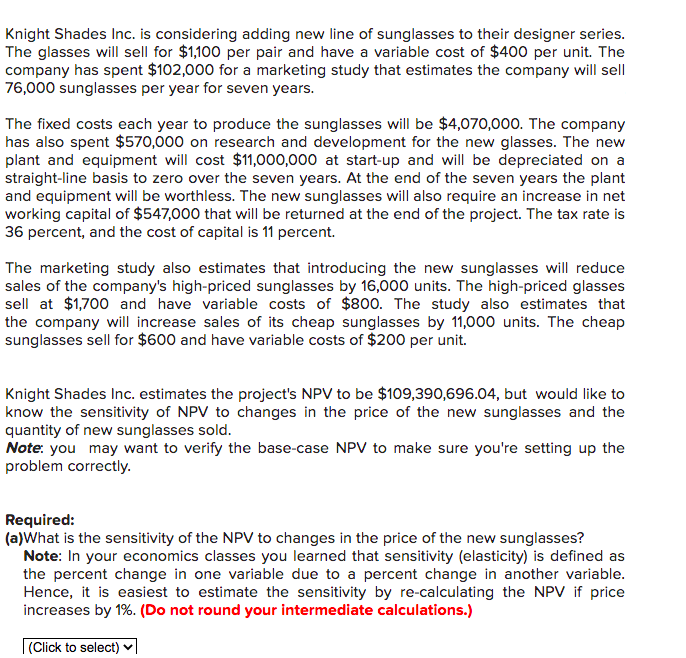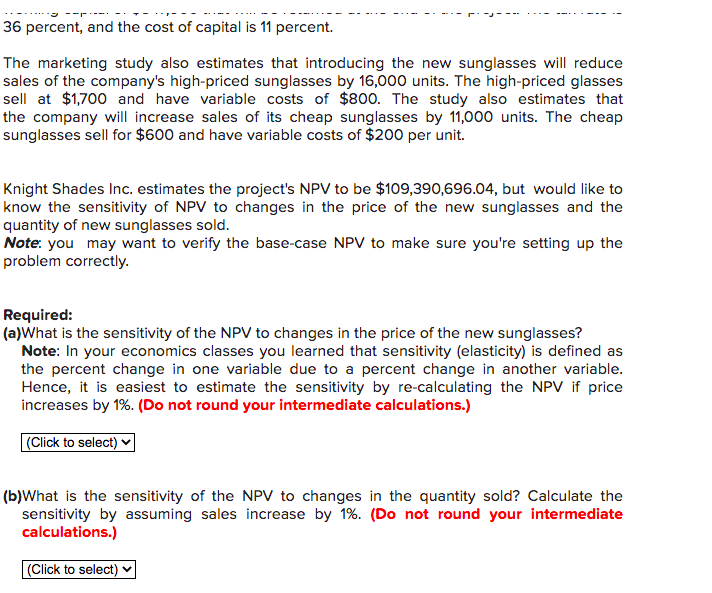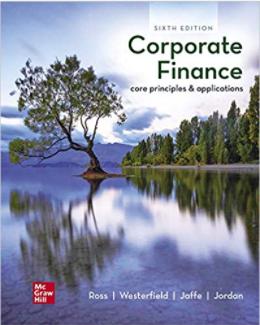Answered step by step
Verified Expert Solution
Question
1 Approved Answer
Knight Shades Inc. is considering adding new line of sunglasses to their designer series. The glasses will sell for $1,100 per pair and have


Knight Shades Inc. is considering adding new line of sunglasses to their designer series. The glasses will sell for $1,100 per pair and have a variable cost of $400 per unit. The company has spent $102,000 for a marketing study that estimates the company will sell 76,000 sunglasses per year for seven years. The fixed costs each year to produce the sunglasses will be $4,070,000. The company has also spent $570,000 on research and development for the new glasses. The new plant and equipment will cost $11,000,000 at start-up and will be depreciated on a straight-line basis to zero over the seven years. At the end of the seven years the plant and equipment will be worthless. The new sunglasses will also require an increase in net working capital of $547,000 that will be returned at the end of the project. The tax rate is 36 percent, and the cost of capital is 11 percent. The marketing study also estimates that introducing the new sunglasses will reduce sales of the company's high-priced sunglasses by 16,000 units. The high-priced glasses sell at $1,700 and have variable costs of $800. The study also estimates that the company will increase sales of its cheap sunglasses by 11,000 units. The cheap sunglasses sell for $600 and have variable costs of $200 per unit. Knight Shades Inc. estimates the project's NPV to be $109,390,696.04, but would like to know the sensitivity of NPV to changes in the price of the new sunglasses and the quantity of new sunglasses sold. Note: you may want to verify the base-case NPV to make sure you're setting up the problem correctly. Required: (a) What is the sensitivity of the NPV to changes in the price of the new sunglasses? Note: In your economics classes you learned that sensitivity (elasticity) is defined as the percent change in one variable due to a percent change in another variable. Hence, it is easiest to estimate the sensitivity by re-calculating the NPV if price increases by 1%. (Do not round your intermediate calculations.) (Click to select) 36 percent, and the cost of capital is 11 percent. The marketing study also estimates that introducing the new sunglasses will reduce sales of the company's high-priced sunglasses by 16,000 units. The high-priced glasses sell at $1,700 and have variable costs of $800. The study also estimates that the company will increase sales of its cheap sunglasses by 11,000 units. The cheap sunglasses sell for $600 and have variable costs of $200 per unit. Knight Shades Inc. estimates the project's NPV to be $109,390,696.04, but would like to know the sensitivity of NPV to changes in the price of the new sunglasses and the quantity of new sunglasses sold. Note: you may want to verify the base-case NPV to make sure you're setting up the problem correctly. Required: (a) What is the sensitivity of the NPV to changes in the price of the new sunglasses? Note: In your economics classes you learned that sensitivity (elasticity) is defined as the percent change in one variable due to a percent change in another variable. Hence, it is easiest to estimate the sensitivity by re-calculating the NPV if price increases by 1%. (Do not round your intermediate calculations.) (Click to select) (b) What is the sensitivity of the NPV to changes in the quantity sold? Calculate the sensitivity by assuming sales increase by 1%. (Do not round your intermediate calculations.) (Click to select)
Step by Step Solution
There are 3 Steps involved in it
Step: 1

Get Instant Access to Expert-Tailored Solutions
See step-by-step solutions with expert insights and AI powered tools for academic success
Step: 2

Step: 3

Ace Your Homework with AI
Get the answers you need in no time with our AI-driven, step-by-step assistance
Get Started


